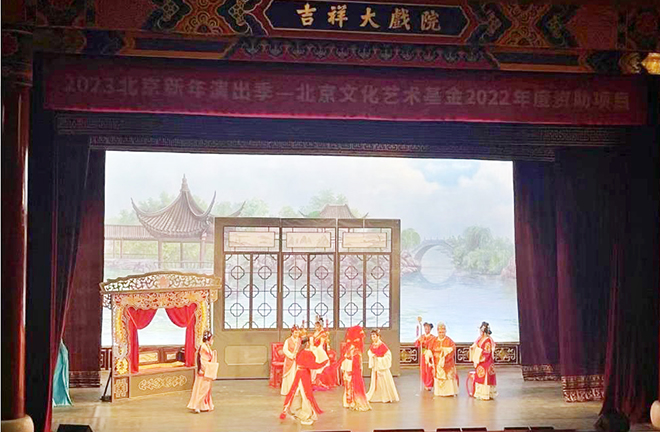Seminar reviews tradition of stylistics

A performance of The Dream of the Red Chamber Photo: Weng Rong/CSST
The Academic System with Chinese Characteristics and Ancient Literature Research Forum and the Launch of “Essential Works of Contemporary Chinese Scholarship” (Ancient Literature) were concurrently held in Nanjing, Jiangsu Province, in early January, at which a collection including Bian Xiaoxuan’s New Exploration of Tang Legends, Zhou Xunchu’s A Micro Exploration of Literary History, Mo Lifeng’s Zhu Xi Literature Research, Zhang Bowei’s A Review of Literary Research, and Cheng Zhangcan’s Wei, Jin, Southern and Northern Dynasties Fu Literature History were released.
Modern value
From The Book of Songs, The Songs of Chu, to The Dream of the Red Chamber, and Strange Tales from a Chinese Studio, ancient Chinese literary classics possess both aesthetic and thought-provoking functions. Mo Lifeng, a professor from the School of Liberal Arts at Nanjing University (NJU), emphasized the importance of a clear purpose for the discipline of ancient Chinese literature. Culture is the spiritual blood of a nation, and serves as an effective means to maintain the lasting prosperity of the nation. Ancient Chinese literature represents the most important conceptual culture within fine traditional Chinese culture, not only peaking in terms of artistry, but also containing rich humanistic spirit and social value.
In building a modern Chinese civilization with fine traditional resources, ancient Chinese literature should and can exert a more significant role. However, difficulties exist in the popularization and dissemination of ancient literary classics, Mo added. This requires researchers to appraise the value of ancient literary works and select the classics suitable for contemporary China to publicly promote. It is necessary to provide the popular readings in the forms of anthologies, variorums, and annotated versions of the selected classics based on literature compilation and theoretical discussions.
Is it possible for ancient stylistic traditions to be creatively transformed? Wu Chengxue, a professor from the Department of Chinese Language and Literature at Sun Yat-sen University, pointed out that ancient literary forms inherently possess modern significance, contemporary vitality, as well as the potential for creative transformation, since many modern genres have evolved from ancient ones and share similarities. Poetry, fiction, drama, and even fu (prose poetry) and zhaji (reading notes) still occupy living space and fulfill social needs in contemporary society. It is inadvisable to treat ancient literature as an academic pursuit divorced from social reality, but rather integrate it with literary practices and realistic needs.
Ways forward
While modern Chinese scholarship has undertaken a century-long journey, ancient Chinese literature has always been committed to integrating itself with new knowledge, consciously pursuing the subjectivity of humanistic scholarship and establishing an academic system with Chinese characteristics. Attendees at the conference exchanged views on academic prejudices against the study of rhetoric, literary research discourse limitations, proper methods for examining the exquisiteness of literature, and the improvement approach to classical academic research.
Chen Yinchi, a professor from the Department of Chinese Language and Literature at Fudan University, said that research with retrospective value usually possesses comprehensive, summative, or connective features, and its research objects fall within the main vein of scholarly research. Chen expressed his preference to read “big judgments” rather than “small results.” The former creates more research space for later generations of scholars, while the latter is more likely to produce fine conclusions but lacks continuity.
Hu Xiaoming, a professor from the Department of Chinese Language and Literature at East China Normal University, concluded that lineage is a prerequisite for building distinctively Chinese academic systems, illuminating the “path” that Chinese scholarship has traveled, while adhering to traditional academic concepts such as “the trinity of yili [moral and philosophical principles], kaoju [evidential learning], and cizhang [poetry and prose],” “the mutual penetration between literature and history,” as well as “the classification of literature by different types and schools to present a clear development context.” Modern scholars are tasked with clarifying the problems that the ancients did not explain clearly, while further magnifying their wisdom with modern thought.
The conference was co-sponsored by the School of Liberal Arts, the Institute for Advanced Studies in Humanities and Social Sciences, and the Collaborative Innovation Center of Chinese Literature and East Asian Civilization at NJU, as well as the Commercial Press.
Edited by YANG LANLAN
